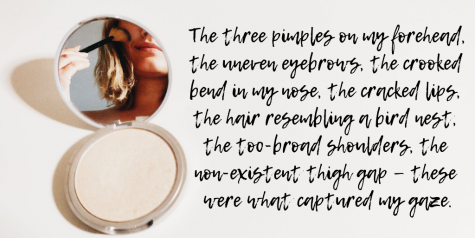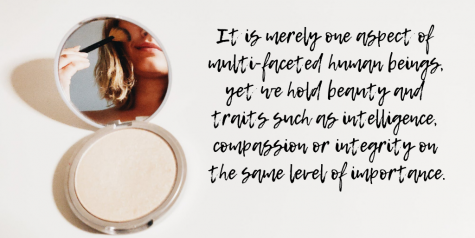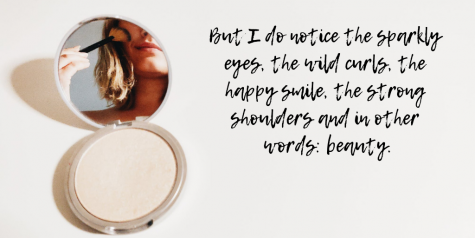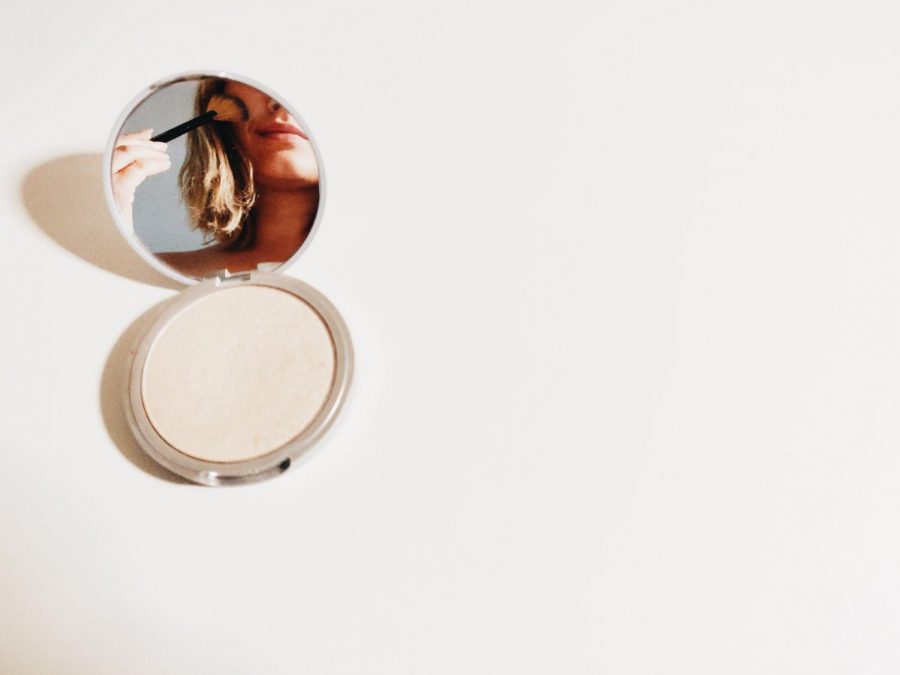Constant Change: As I opposed beauty
Discovering the real meaning of “beautiful”
February 28, 2019
I stared into the mirror. The sunlight poured through the window at my right; some of it reflected off the mirror, creating a small rainbow. It was beautiful. But that wasn’t what caught my attention. The three pimples on my forehead, the uneven eyebrows, the crooked bend in my nose, the cracked lips, the hair resembling a birds nest, the too-broad shoulders, the non-existent thigh gap — these were what captured my gaze. I turned away, accompanied by a dark cloud hanging over my head.

That was me a couple years ago. The reflection I saw in the mirror everyday? Hands down one of the most undesirable views I ever had the misfortune to witness. However, I don’t blame myself or feel surprise for this deprecating outlook. It isn’t easy for a pre-teen to understand that beauty is one of the most incredibly subjective concepts to have ever existed. It’s like math; there are countless possible equations that can result in the number two as a solution (please note that this analogy does not mean I enjoy math), just like there are a million possible faces and bodies that can be deemed beautiful. Yet for a younger me, the social construct of beauty that society had created — rock hard abs or blonde hair and blue eyes —was hard to let go of.
And so, I would gaze at myself in the mirror every day and critique all the flaws that seemed so incredibly significant back then. I would look down at the scale and curse at the number that always seemed too high. I would pick up a cookie and immediately toss it aside (okay I’ll admit I always went back to eat it afterwards). Yet this cycle of constantly feeling unbeautiful was taxing, and eventually, for a multitude of reasons, I realized I wasn’t the problem. My misconception of what beauty actually entails was the problem.
This change wasn’t abrupt — change never is — but regardless, it became pretty clear to me that beauty was an elaborate social construct (another example of a social construct would be the high school GPA … or that’s what I tell myself). I told myself it was a little like sexism. It’s always been difficult for me to understand why people believe a singular aspect of a person is their defining characteristic. A simple biological difference between humans, hormones, is the root of centuries of oppression and unequal rights. And similarly, it’s now difficult for me to understand why so much importance is placed on physical beauty. It is merely one aspect of multi-faceted human beings, yet we hold beauty and traits such as intelligence, compassion or integrity on the same level of importance.

In my eyes, beauty, especially society’s warped meaning of it, is somewhat irrelevant. Society’s perception of beauty standards has shifted multiple times throughout history. For instance, at one point, being plump was seen as desirable. To me, it felt pointless to chase after these meaningless, volatile standards and fix what I saw as a flawed image in the mirror.
As irrelevant as I may think it is, we are all a little obsessed with beauty. Clichés gravitate towards beauty like moths to light. A few exasperatingly common ones: Beauty is in the eye of the beholder. Beauty is power. Beauty is only skin deep — now this is the one that I, and a lot of people around me, have a hard time believing. Everyone says that it’s what’s on the inside that matters, but perhaps agonizing over a number on a scale can be a lot easier than believing a vague saying about how beauty is sometimes a facade to what lies beneath.
While it’s true that beauty can be hidden, it is also found anywhere and everywhere. For instance, I bought a new bike two days ago. Correction: my mom forced me to buy a bike because she didn’t like the fact that I was sitting on my bed all day doing, in her eyes, nothing (she’s wrong, I was watching “Grey’s Anatomy”). This bike, despite its unsolicited arrival, is quite fun to ride. But I don’t ride it because of my mom’s newfound interest in my fitness. Or because I want abs or toned legs or a thigh gap — in other words, to attain beauty.

I ride because the feeling of wind whipping my hair back is, if I were to use just one word, beautiful. Occurrences of beauty can be subtle or dramatic, so when I stare into the mirror these days, I don’t notice the three pimples on my forehead, the uneven eyebrows, the crooked bend in my nose, the cracked lips, the hair resembling a bird-nest, the too-broad shoulders, the non-existent thigh gap. But I do notice the sparkly eyes, the wild curls, the happy smile, the strong shoulders and in other words: beauty.

















